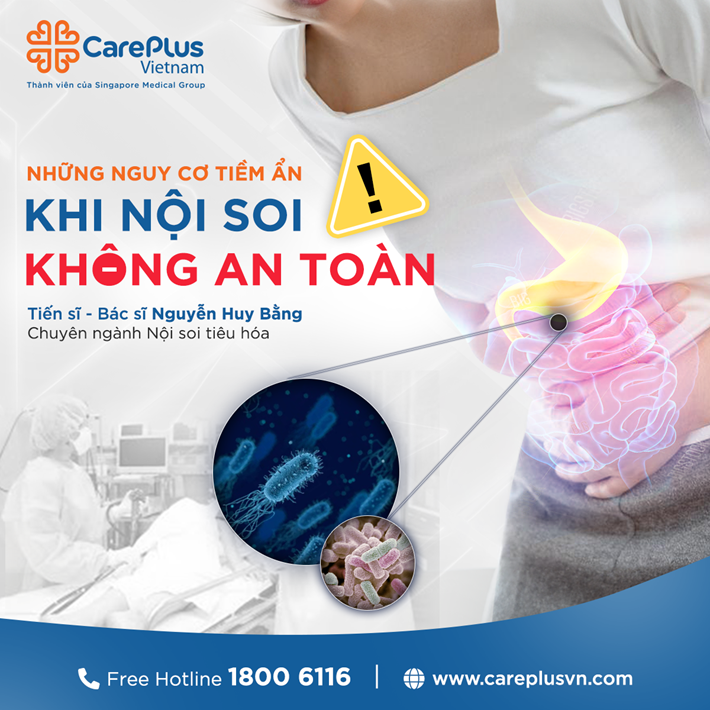POTENTIAL RISKS OF UNSAFE ENDOSCOPY

12/26/2023 2:48:08 PM
This article is expertly advised by Dr. Doctor Nguyen Huy Bang - Specialized in Gastrointestinal Endoscopy at CarePlus clinic system
Flexible endoscopy helps doctors detect many gastrointestinal diseases but can also increase the risk of infection if the endoscope is not sterilized properly. Endoscopy is the most optimal method for screening and detecting stomach and colon cancer.
Flexible endoscopy technique with M-NBI (Magnifying NBI) narrow-band imaging magnification endoscopy technology helps doctors observe tissue and mucosa in the digestive tract. Based on magnified images, doctors can diagnose the disease, accurately assess the damage, remove polyps, biopsy specimens, test for H.P. bacteria, and screen for early gastrointestinal cancer. Chemistry. Endoscopic anesthesia is considered a safe method, does not cause discomfort, does not affect memory and the brain, and helps patients recover quickly after endoscopic procedures.
Besides the outstanding advantages of the method, if infection control during cleaning, disinfection, and preservation of endoscopes is not guaranteed, the risk of many gastrointestinal diseases due to infection from person to person increases. Others. Many reports have documented that many common microorganisms cause diseases transmitted through endoscopes.
Bacterial infections cause disease
Some bacteria, E.coli, Klebsiella pneumoniae, typhoid, tuberculosis bacillus, blue pus bacillus... can be transmitted through endoscopy when the endoscope wire and instruments are not cleaned and disinfected according to proper procedures. This infection is hazardous when these bacteria are resistant to drugs.
Hepatitis virus infection
Hepatitis B virus is dangerous because patients often do not know they are infected. Symptoms of the disease are not typical. Hepatitis B virus entering the body will cause liver function to decline. When the disease turns into a chronic stage and is not managed according to the doctor's regimen, the patient can experience many dangerous complications, such as cirrhosis, acute liver failure, and liver cancer.
The causes of infection through endoscopy include objective and subjective causes. The objective reason is the overload of patients undergoing endoscopy in many hospitals and the lack of endoscopy equipment. Subjective causes due to shortened cleaning and disinfection processes: not checking for leaks after each endoscopy and not enough disinfection soaking time; this depends on the awareness of the person cleaning and disinfection tools as well as supervision of the implementing unit.
According to the American Society for Gastrointestinal Endoscopy, if the sterilization process is safe, the infection rate due to endoscopes is only about 1 case for every 1.8 million procedures. Infection control in digestive endoscopy is essential in determining patient safety during disease detection and treatment. Medical staff at the CarePlus clinic system are trained in infection control, implementing correct procedures, and ensuring patients do not transmit diseases during endoscopy.
After using the endoscope, medical staff cleaned according to the following procedure:
1. On-site processing
2. Test the scope for leaks after each examination to ensure the scope is not punctured
3. Clean and finally place the tools in the automatic washing and disinfecting machine system for >21 minutes.
4. The machine will be stored in a cabinet with an automatic drying and sterilization system after it has been safely sterilized.
The steps in the cycle are performed one after another. Medical staff cannot skip any essential steps or arbitrarily shorten the process to minimize the risk of infection for the next patient.